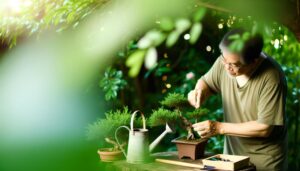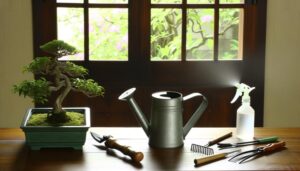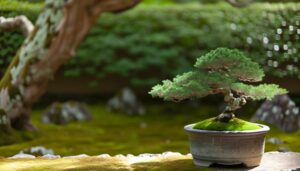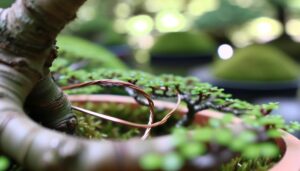10 Surprising Benefits of a Bonsai Plant in Your Home
Bringing a bonsai plant into your home provides numerous advantages. Bonsai cultivation supports stress reduction by promoting mindfulness and engaging the parasympathetic nervous system.
These plants enhance air quality through phytoremediation, thereby increasing indoor humidity and filtering pollutants. Moreover, the meticulous nature of bonsai care improves cognitive focus, fosters patience, and boosts creative thinking.
The aesthetic appeal of bonsai also contributes to a calming, mindful environment, enhancing overall mental well-being. For those interested, further exploration will reveal deeper insights into these benefits and techniques.
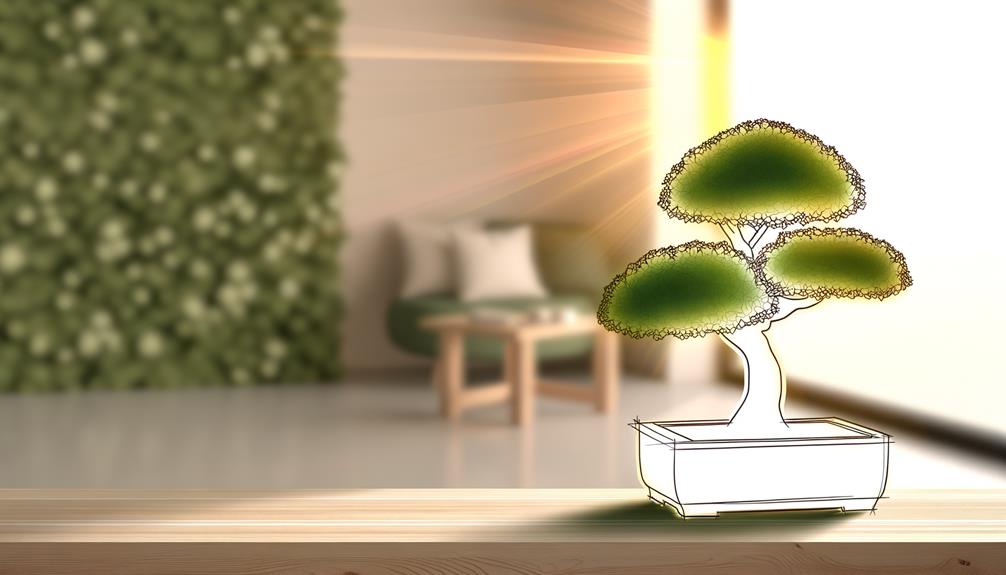
Key Takeaways
- Bonsai plants reduce stress levels through mindfulness and meditative focus.
- Bonsai plants purify indoor air by absorbing pollutants and increasing humidity.
- Cultivating bonsai enhances cognitive focus and productivity.
- Bonsai care fosters patience and disciplined time management.
- Bonsai plants stimulate creative thinking and problem-solving abilities.
Stress Reduction
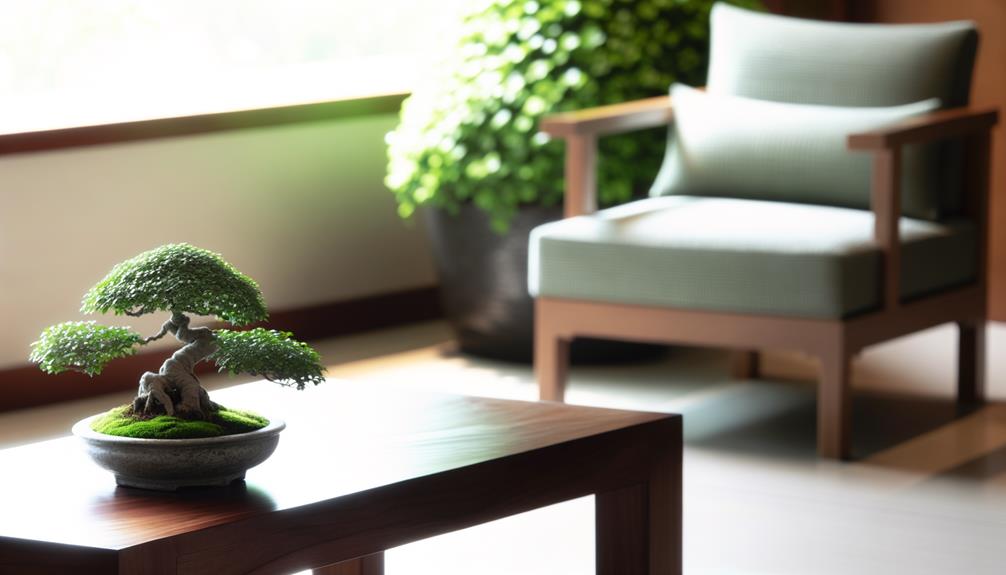
The cultivation and maintenance of bonsai plants have been scientifically demonstrated to substantially reduce stress levels through the promotion of mindfulness and a meditative focus on intricate horticultural practices. By engaging in the meticulous care required for bonsai, which includes pruning, wiring, and repotting, individuals enter a state of flow that enhances psychological well-being.
This practice necessitates sustained attention and precision, allowing for a temporary disengagement from daily stressors. Moreover, the act of nurturing a living organism fosters a sense of accomplishment and connection to nature, which has been shown to elevate mood and reduce anxiety.
The repetitive, rhythmic tasks associated with bonsai care can activate the parasympathetic nervous system, thereby inducing relaxation and mitigating the physiological symptoms of stress.
Air Purification
In addition to their aesthetic appeal, bonsai plants contribute to indoor air purification by absorbing pollutants and releasing oxygen, thereby enhancing air quality.
Specifically, bonsai species such as Ficus and Juniper are known for their ability to sequester airborne toxins like formaldehyde, benzene, and trichloroethylene through a process called phytoremediation. The plant's leaves and roots work synergistically to metabolize these harmful compounds, converting them into harmless substances.
Additionally, the transpiration process of bonsai increases humidity levels, which reduces the prevalence of respiratory issues and allergens. By integrating bonsai plants into indoor spaces, one can achieve a more breathable environment, fostering better overall health and well-being.
This dual functionality underscores the significant role bonsai play in maintaining an ecologically balanced indoor habitat.
Enhanced Focus
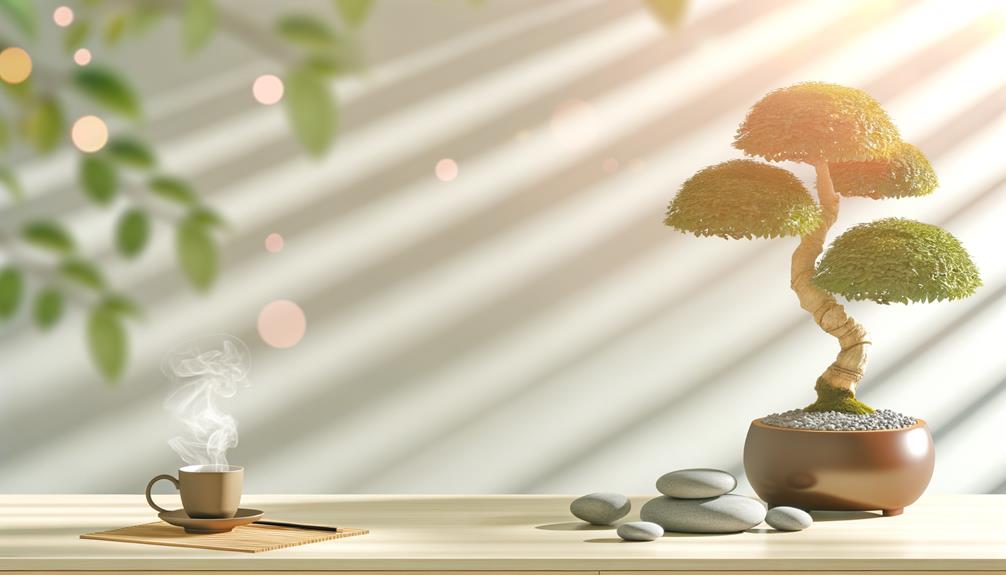
Many individuals find that the presence of bonsai plants in their workspace greatly enhances cognitive focus and productivity. This phenomenon can be attributed to the biophilic design principles, which posit that humans have an inherent need to connect with nature.
The meticulous care required for maintaining a bonsai plant, including pruning and watering, fosters a mindful environment conducive to concentration. The visual aesthetics of bonsai, with their intricate foliage and balanced form, also serve as a natural stress reducer, mitigating mental fatigue.
Studies indicate that incorporating natural elements into one's workspace can lead to a significant improvement in attentional capacity and cognitive resilience. Consequently, bonsai not only beautify the space but substantively contribute to a more focused and productive work setting.
Creativity Boost
Numerous studies have shown that the presence of bonsai plants can greatly enhance creative thinking and problem-solving capabilities.
The intricate process of cultivating bonsai requires meticulous attention to detail and strategic foresight, which in turn stimulates cognitive flexibility—an essential component for creativity.
Additionally, the aesthetic appeal of bonsai plants can evoke a calming ambiance, facilitating a mental state conducive to innovative thought.
The natural elements of bonsai, such as their miniature landscapes, provide complex visual stimuli that can inspire novel ideation and artistic expression.
Furthermore, engaging with bonsai care introduces novel challenges and scenarios, encouraging divergent thinking and the generation of multiple solutions.
Therefore, integrating bonsai plants into one's living space can serve as a catalyst for heightened creative performance.
Improved Patience
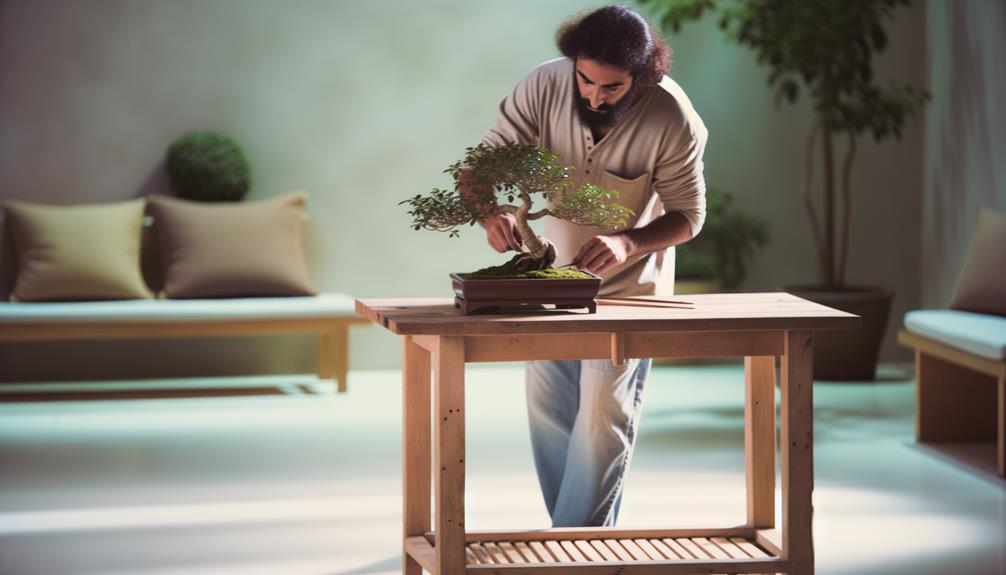
Cultivating bonsai plants inherently demands a sustained investment of time and meticulous care, thereby fostering a significant enhancement in one's patience. The process involves precise pruning, careful wiring, and consistent monitoring of soil moisture and nutrient levels, all of which are gradual and deliberate actions.
This continuous engagement necessitates the practitioner to develop a long-term perspective, appreciating incremental progress rather than immediate results. The iterative nature of bonsai cultivation, including the cyclical processes of growth and dormancy, further instills a disciplined approach to time management.
Additionally, the requirement for seasonal adjustments and adaptations to environmental conditions enhances one's ability to remain patient under varying circumstances. This way, bonsai cultivation not only refines horticultural skills but also profoundly augments personal patience.
Aesthetic Appeal
Bonsai plants serve as exquisite artistic home decor, seamlessly integrating natural beauty with refined craftsmanship. Their intricate forms and meticulously maintained structures provide natural visual interest, enhancing the aesthetic value of interior spaces.
Additionally, the unique nature of bonsai often acts as a distinctive conversation starter, drawing attention to their horticultural and artistic significance.
Artistic Home Decor
The intricate design and meticulous pruning of bonsai plants play a crucial role in serving as sophisticated elements of artistic home decor, enhancing the visual appeal of any interior space. These living sculptures embody a blend of horticultural expertise and artistic expression, making them distinctive focal points in home design.
| Aspect | Description | Impact on Decor |
|---|---|---|
| Aesthetic Versatility | Complements various interior styles, from minimalist to traditional | Harmonizes with diverse settings |
| Scale and Proportion | Small size guarantees they fit in any room without overwhelming space | Balances spatial dynamics |
| Seasonal Variation | Changes in appearance throughout seasons add dynamic visual interest | Creates a dynamic ambiance |
| Craftsmanship | Demonstrates dedication and artistic precision | Elevates the perceived sophistication |
| Cultural Significance | Represents rich historical and cultural narratives | Adds depth and context to decor |
This fusion of art and nature not only transforms spaces but also imbues them with tranquility and elegance.
Natural Visual Interest
Incorporating a bonsai plant into interior design introduces an element of natural visual interest that captivates observers through its intricate structure and seasonal metamorphoses.
The meticulous pruning and shaping of bonsai trees result in miniature yet highly detailed representations of their full-sized counterparts. These living sculptures exhibit complex branch arrangements, textured bark, and varying foliage patterns, which collectively enhance the aesthetic appeal of any space.
Seasonal alterations further augment their visual intrigue, as leaves evolve through vibrant hues, flowers bloom, and fruit may even appear. This dynamic display of nature's beauty in a compact form provides a focal point that enriches the ambiance, offering a blend of tranquility and sophistication to interior environments.
Unique Conversation Starter
As a unique feature of interior design, a bonsai plant serves as a captivating conversation starter. It attracts attention through its meticulous craftsmanship and the artistic representation of natural beauty in miniature form.
The intricate process of nurturing bonsai involves precise pruning, wiring, and potting techniques. This showcases horticultural expertise and artistic finesse. Each bonsai encapsulates a miniature ecosystem, reflecting the patience and dedication required for its creation.
This exceptional blend of artistry and nature not only enhances the visual appeal of any space but also prompts discussions on its historical significance, cultivation practices, and the philosophical foundations of bonsai culture.
Therefore, a bonsai plant becomes more than just a decorative piece; it is a tribute to natural harmony and human skill.
Mindfulness Practice
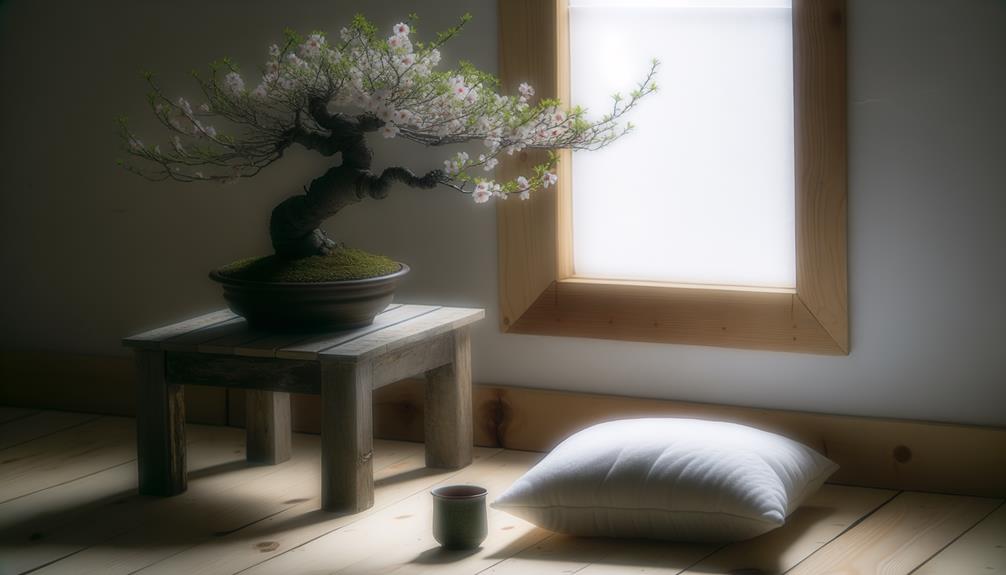
Cultivating bonsai requires meticulous attention to detail and sustained focus, thereby enhancing cognitive functions related to patience and concentration.
Engaging in this intricate horticultural practice can serve as an effective stress relief technique, leveraging the principles of biophilia and mindfulness to promote mental well-being.
The deliberate and thoughtful care involved in bonsai cultivation aligns with therapeutic methodologies designed to reduce psychological stressors.
Focus and Patience Enhancement
Engaging in the meticulous care of a bonsai plant inherently cultivates enhanced focus and patience, serving as a profound mindfulness practice. This horticultural art demands sustained attention to detail, promoting cognitive discipline and meticulousness. The iterative process of pruning, wiring, and repotting requires not only technical proficiency but also a deep sense of presence and timing.
| Aspect | Benefit |
|---|---|
| Pruning | Enhances precision and control |
| Wiring | Develops strategic planning |
| Repotting | Cultivates patience and timing |
Each activity necessitates a calm and deliberate approach, fostering a meditative state that sharpens mental acuity and perseverance. Consequently, bonsai cultivation is not merely an aesthetic endeavor but a valuable exercise in enhancing one's mental faculties through consistent, mindful engagement.
Stress Relief Techniques
The meticulous practices involved in bonsai cultivation not only enhance focus and patience but also serve as effective techniques for stress relief through mindfulness. Engaging in bonsai care requires concentrated attention and deliberate actions, which are core components of mindfulness practice.
The following are key aspects that contribute to stress relief:
- Sensory Engagement: Handling soil, water, and pruning tools activates tactile senses, grounding individuals in the present moment.
- Rhythmic Breathing: The repetitive, slow nature of bonsai pruning encourages deep, rhythmic breathing, which can lower cortisol levels and promote relaxation.
- Meditative Focus: The intricate care routine necessitates sustained mental focus, which mirrors meditative practices, helping to alleviate anxiety and foster a calm mental state.
These elements collectively support mental well-being and stress reduction.
Educational Value
Understanding the detailed care requirements and growth patterns of bonsai plants offers an in-depth education on botany and horticultural techniques. Engaging with bonsai cultivation necessitates familiarity with plant physiology, soil composition, and water retention properties, enriching one's understanding of plant science.
In addition, it involves mastering pruning, wiring, and repotting methods, which are crucial in manipulating the plant's aesthetic and structural form. This hands-on approach provides practical insights into life cycles, photosynthesis, and environmental adaptation.
Furthermore, the microcosmic representation of natural landscapes in bonsai culture underscores ecological principles and biodiversity. Consequently, bonsai horticulture serves as a thorough, experiential learning platform for enthusiasts and professionals alike, fostering a deep appreciation and understanding of plant biology and environmental stewardship.
Therapeutic Benefits
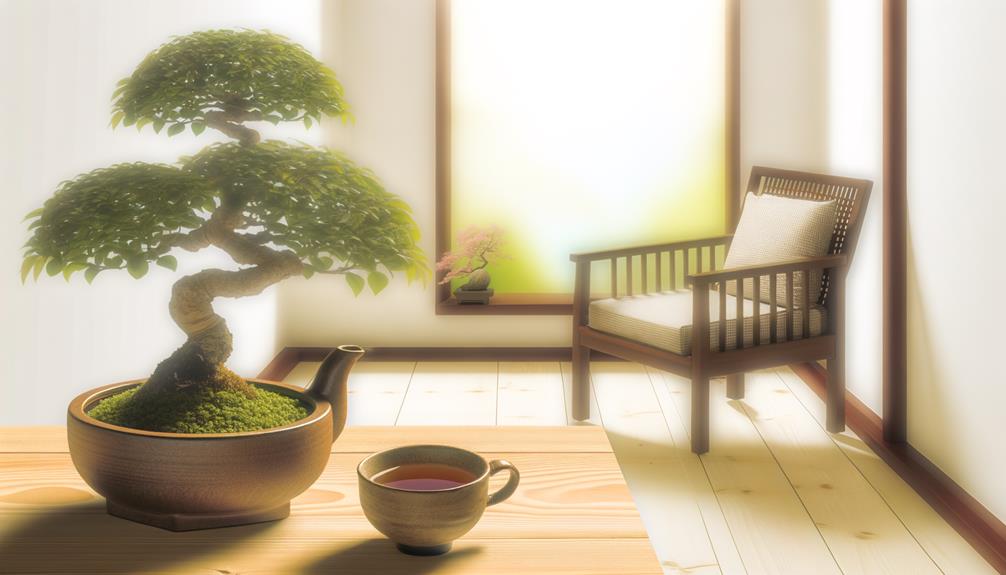
The cultivation and maintenance of bonsai plants offer significant therapeutic benefits, including effective stress reduction, enhanced mindfulness, and an overall boost in emotional well-being.
Engaging in the meticulous care of these miniature trees can activate parasympathetic nervous system responses, thereby mitigating anxiety and promoting relaxation.
Moreover, the focused attention required for bonsai care fosters mindfulness practices, which are instrumental in improving cognitive function and emotional regulation.
Stress Reduction Aid
Engaging with bonsai cultivation offers a meditative practice that greatly contributes to stress reduction and overall mental well-being. This meticulous art form requires a focused and delicate approach, promoting a sense of calm and tranquility.
The therapeutic benefits of bonsai care are substantiated through several mechanisms:
- Cognitive Engagement: The intricate process of pruning and shaping bonsai trees stimulates cognitive functions, distracting the mind from stressors and promoting mental clarity.
- Sensory Interaction: Handling soil, water, and plant materials engages tactile senses, which can have a grounding effect, reducing anxiety.
- Biophilic Connection: The innate human affinity for nature, known as biophilia, is satisfied through bonsai cultivation, fostering emotional resilience and a serene mental state.
These elements collectively underscore the significant role of bonsai in stress alleviation.
Mindfulness and Focus
Cultivating bonsai trees demands an appreciably high level of mindfulness and sustained focus, which are pivotal for achieving therapeutic benefits such as enhanced emotional regulation and mental clarity. The meticulous pruning, wiring, and watering routines necessitate undivided attention, effectively serving as a meditative practice.
Engaging in these activities activates the prefrontal cortex, promoting cognitive functions such as concentration and problem-solving. The repetitive, deliberate actions involved in bonsai care can induce a state of flow, a psychological concept where individuals are fully immersed and present in their tasks. This immersion facilitates a reduction in cognitive overload, allowing for improved mental clarity and the regulation of stress responses.
Consequently, the practice notably contributes to maintaining a balanced and focused mental state.
Emotional Well-being Boost
Practicing bonsai cultivation can greatly enhance emotional well-being by leveraging therapeutic mechanisms. These include stress reduction, mood stabilization, and the fostering of a sense of accomplishment.
The meticulous care required in pruning, watering, and shaping bonsai trees can serve as an effective form of horticultural therapy. It provides a tangible outlet for creative expression and emotional release.
- Stress Reduction: Engaging with bonsai gardening activates parasympathetic nervous responses. This helps in reducing cortisol levels and promoting relaxation.
- Mood Stabilization: The rhythmic, repetitive tasks involved in bonsai care can induce a meditative state. This can help in mitigating symptoms of anxiety and depression.
- Sense of Accomplishment: The long-term commitment and visible progress in bonsai cultivation can enhance self-efficacy. This contributes to improved self-esteem and overall life satisfaction.
Indoor Gardening
Indoor gardening, particularly the cultivation of bonsai plants, offers a unique blend of horticultural artistry and precise botanical maintenance that can enhance both the aesthetic and air quality of interior spaces.
Bonsai require meticulous care, including controlled pruning, wiring, and repotting, ensuring a symbiotic balance between root and foliage growth. This intricate process not only creates visually alluring miniaturized trees but also optimizes photosynthetic efficiency, contributing to improved indoor air quality.
Additionally, the transpiration process of bonsai enhances humidity levels, beneficial in arid environments. By incorporating bonsai into indoor gardening practices, enthusiasts can achieve a harmonious integration of natural beauty and functional environmental benefits, making them an exceptional addition to any home or office setting.
Conversation Starter

Integrating bonsai plants into indoor gardening not only enhances environmental aesthetics and air quality but also serves as an engaging conversation starter, inviting dialogue on the intricate techniques and cultural significance behind this ancient horticultural practice.
The meticulous care required for bonsai cultivation can intrigue guests, offering a gateway to discuss various aspects:
Cultivation Techniques: Detailed discussion on the pruning, wiring, and repotting methods essential for maintaining the miniature stature and health of bonsai trees.
Historical Context: Exploration of bonsai's origins in East Asian cultures, emphasizing its evolution and significance in Zen Buddhism and Japanese art.
Botanical Varieties: Examination of the diverse species used in bonsai, such as Ficus, Juniper, and Pine, highlighting their unique characteristics and care requirements.
These topics enrich social interactions and foster a deeper appreciation for botanical artistry.
Personal Accomplishment
Cultivating bonsai plants offers a deep sense of personal achievement. It requires a high level of accuracy, patience, and an understanding of advanced horticultural techniques. Mastery of bonsai cultivation involves careful pruning, wiring, and root trimming. All of these demand a profound knowledge of plant physiology and growth patterns.
Achieving the desired aesthetic and maintaining the health of these miniature trees requires consistent monitoring and adjustment of environmental factors such as humidity, light, and soil composition. The successful nurturing of a bonsai plant thus stands as a testament to one's dedication and skill, providing a lasting sense of accomplishment.
This intricate process not only improves one's horticultural expertise but also nurtures a deeper connection with nature through mindful engagement.
Conclusion
In the serene landscape of one's home, the bonsai plant stands as a beacon of tranquility and refinement. Its miniature form silently purifies the air, while its intricate care regimen cultivates enhanced focus, creativity, and patience.
This living sculpture not only serves as a therapeutic ally but also transforms indoor spaces into verdant sanctuaries. The bonsai, in this way, is not merely a plant but a symbol of personal achievement and an eloquent conversation starter within any abode.

